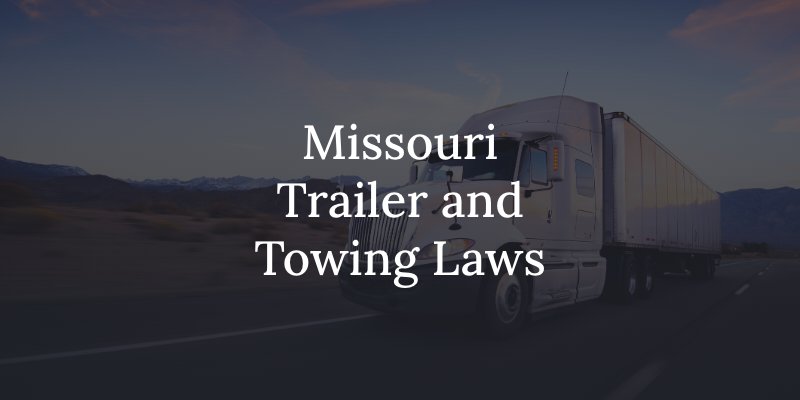Missouri’s winding rural roads and busy communities see many vehicles towing trailers, both camper trailers and utility trailers of many types and sizes. The state describes a trailer as the following:
“a unit attached to and towed by a motorized vehicle designed to carry property and/or passengers. A trailer cannot be motorized or self-operable.”
Like all states, Missouri has laws regulating the safe use and operation of trailers. These regulations help to keep Missouri motorists safe while sharing the roadway with vehicles towing trailers. Often difficult to interpret, our St. Louis truck accident attorneys can work with you to discover how these laws may impact your claim.

Types of Trailers Found in Missouri
Missouri’s definition of towing trailers includes any of the following:
- Camping trailers
- Utility trailers
- Boat trailers
- Farm wagons
- Kit trailers
- Flatbed trailers
- Livestock trailers
- Homemade trailers, and
- Semi-trailers
Trailers in Missouri must be registered and titled with the exception of hay and cotton trailers and tow dollies.
Titling and Registering a Trailer in Missouri
After purchasing a trailer in Missouri, the purchaser has up to 30 days to title the trailer and pay sales tax. Failing to title the trailer within 30 days results in a $25.00 penalty and an additional $25.00 penalty for every month further that it remains unregistered for a maximum penalty of $200.00.
To title a trailer, the owner must have the title certificate or a manufacturer’s statement of origin (MS0) unless the trailer was an out-of-state purchase from a state that doesn’t require a trailer title or registration. Farm trailers and kit trailers only require a bill of sale or proof of purchase. Title fees for Missouri trailers are $8.50 and the registration fee is $750 for one year, $22.50 for three years, or $52.50 for a permanent registration.
Trailer purchasers can use the state’s calculating tool to estimate their sales tax.
Inspection Requirements for Homemade Trailers in Missouri
Homemade trailers in Missouri require an inspection by the Missouri State Highway Patrol for a $25.00 inspection fee or by an officer from the Sheriff’s Department in your county. After the inspection, a homemade trailer owner must apply for a title with a completed application, fee payment, and a $14.50 processing fee as well as $13.50 for the license plate.
Lighting and Signal Laws for Missouri Trailers
Trailers in Missouri must have two red taillights, two red reflectors, and a white light illuminating the trailer’s license plate.
A trailer must have turn signal lights unless a driver can use visible hand signals. To measure hand signal visibility, the distance from the steering post’s center to the left outside of the cab’s body or the load must be less than 24 inches or the distance from the top of the steering post to the rear end of the body or load must be less than 14 feet.
Additional Requirements for Towing Trailers in Missouri
- To legally tow a trailer in Missouri requires the addition of a safety chain as well as the trailer’s coupling device except when using a fifth-wheel device.
- Trailers with fifth-wheel devices and trailers hauling hazardous materials weighing 3,000 pounds require a separate braking system.
- Trailer widths may not exceed 96 inches or 102 inches on interstate highways and other designated highways. Heights may not exceed 13.5 feet or 14 feet on designated highways
- The maximum trailer length allowed is 45 feet, including the load, or 60 feet for semi-tractor-trailers
- Missouri has no laws against passengers riding in trailers or towed campers
Failing to comply with trailer and towing laws in Missouri may result in fines as well as liability in accidents.
The Role of a Missouri Truck Accident Lawyer
If you or a loved one is involved in a truck or trailer accident, a skilled Missouri attorney, such as a St. Louis personal injury lawyer for example, would be crucial for navigating the difficulties of trailer or tow truck laws. Their expertise in state towing and regulations can assist in holding negligent parties accountable. They will also provide great guidance throughout the compensation process regarding damages and losses. An attorney will answer any questions you may have.

